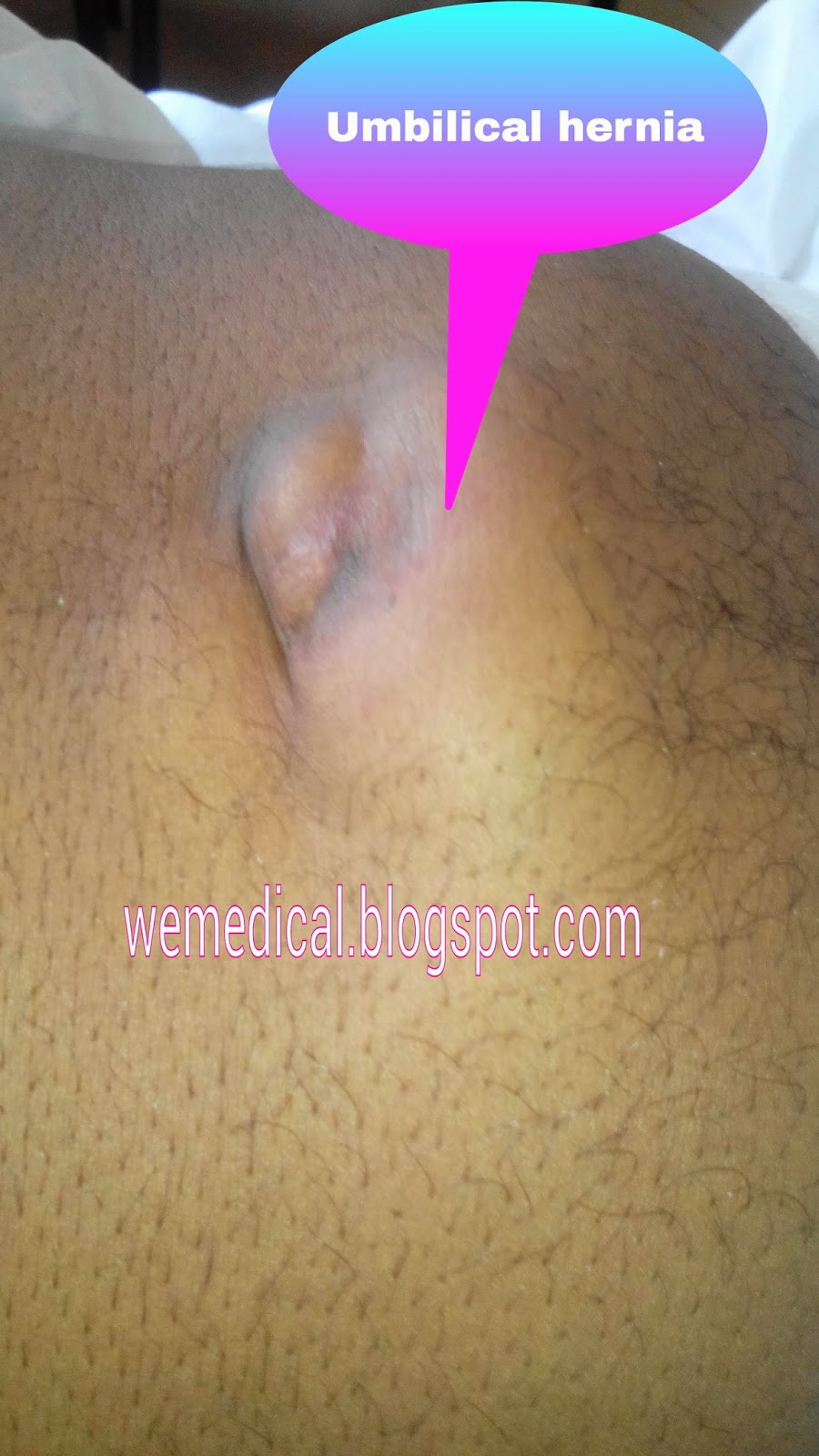42 Years old redah complaining of swelling around umbilicus 2 years ago and associated pain 7 days duration.
On examination:
Expansile impulse on cough, doughy sensation, reducible contents, small defect, smooth surface, normal temperature, no tenderness and very small scar around umbilicus. Smoker; 3 packs per day and lefting heavy objects from 15 years old to 40 years old. No symptoms of other systems. Picture is shown below
Diagnosis : para umbilical hernia.
Operation will be done tomorrow morning.
(Paraumbilical hernia:
A paraumbilical (or umbilical) hernia is a protrusion of the abdominal contents, including mesenteric fat or bowel, through a weak point of the muscles or ligaments near the navel. It can lead to discomfort when fatty tissue gets trapped and a lump can be felt or seen. Whilst they are not usually life-threatening, routine surgical treatment is usually advised to prevent enlargement or strangulation or obstruction of the gut.
Treatment:
The protrusion is put back within the abdomen in the correct position. Stitches are used to strengthen the weakness where the hernia has broken through.
The operation is usually performed under a general anaesthetic.
In most cases this is done as a day case without the need for an overnight stay. From wikipedia ).
Hernia:
Definition
By Mayo Clinic Staff
An umbilical hernia occurs when part of the intestine protrudes through an opening in the abdominal muscles. Umbilical hernia is a common and typically harmless condition. Umbilical hernias are most common in infants, but they can affect adults as well. In an infant, an umbilical hernia may be especially evident when the infant cries, causing the baby's bellybutton to protrude. This is a classic sign of an umbilical hernia.
Many umbilical hernias close on their own by age 1, though some take longer to heal. To prevent complications, umbilical hernias that don't disappear by age 3 or those that appear during adulthood may need surgical repair.
Details about hernia, click the link below:
http://en.m.wikipedia.org/wiki/Hernia












4 comments
The treatment for a hernia is surgery: an operation to repair (fix) the hernia. But, every hernia does not require an operation. For some hernias, only observation – wait and watch – is sufficient.
ReplyNot all hernias need to be operated. The decision about whether or not to operate requires careful consideration of several factors: What is the type of hernia? What is the size? Is it reducible or irreducible? How is your general health? In some cases, the decision is fairly straightforward. In others, a detailed and thoughtful discussion is necessary.
Hernia Treatment in Bangalore
Hernia surgery can be done either by laparoscopy (keyhole surgery) or by open surgery (a long cut). Laparoscopy is preferable to open surgery in most cases. But, in some cases open surgery may be better. A synthetic patch called a mesh is used to reinforce the muscles of your abdominal (tummy wall) in most hernia repair operations. You could think of a mesh as a specially designed fishing net. The mesh remains in your body permanently. It works like scaffolding so that scar tissue can grow into the mesh and strengthen the area. There are different types of meshes and different ways of fixing the meshes to the muscles of the abdominal wall. There are pros and cons for various techniques, and a thoughtful choice needs to be made. Dr Manas Tripathy does both laparoscopic and open hernia surgery, and he will explain the choice that may be best for you.
Specialist for Hernia Singapore-Inguinal hernias are the most basic types of male hernias, that are placed in the below abdomen and thigh, go towards the scrotum, like a bulge in the groin. That is common in men than in women.
ReplyHey thегe and Thank you so much for sharing this information. It has very useful. Please keep sharing.If you want Wish to know about Types of Hernia & Its Symptoms? Kindly click the link
Replytypes of hernia
Hernia treatment
There are several types of treatment options for umbilical hernias, including observation, mesh repair, and laparoscopic repair. Each method has its advantages and disadvantages, so it’s important to discuss these options with the best general surgery hospital before deciding on a course of action.
ReplyPost a Comment